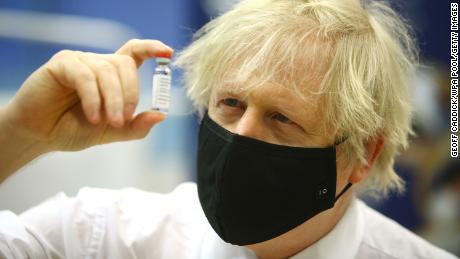
England marks Covid 'Freedom Day' amid surge in cases
A version of this story first appeared in CNN Business’ Before the Bell newsletter. Not a subscriber? You can sign up right here.
London (CNN Business)Despite surging cases of the Delta variant of Covid-19 around the world, investors have largely been brushing off the risks, confident that vaccines will allow economic activity to return to normal.
But that risk assessment may be changing.
What’s happening: Futures on the S&P 500 (INX), Dow (DJX) and Nasdaq Composite (COMP) are all pointing to a weaker open, threatening to deepen Friday’s losses. Markets are also sliding in Europe, with London’s FTSE 100 (UKX) falling 2% and the Stoxx 600 (SXXL) down by a similar margin.
Stock markets have been priced for perfection and investors are beginning to wonder whether a touch more caution is warranted. Even with stocks near record highs, there are legitimate reasons for worry.
The more transmissible Delta variant is causing an alarming rise in coronavirus cases in the United Kingdom and United States, where hospitalizations are also creeping up, as the rate of vaccinations slows.
England is pushing ahead with its so-called “freedom day” on Monday regardless, lifting almost all restrictions on social gatherings and mask wearing, and allowing night clubs to reopen and sports stadiums to operate at full capacity.
But the reopening isn’t eliciting a bullish response from investors. “In markets, Freedom Day is Angst Day as Covid cases rise globally,” Societe Generale strategist Kit Juckes said in a research note on Monday. “The result is a risk averse tone with equities weaker in Asia and Europe, bond yields lower and oil prices down.”
The market’s negative reaction highlights the belief that the pandemic will continue to weigh on businesses and consumers even once lockdown rules are lifted.
See here: A poll published Monday by UK firm YouGov found that between 40% and 50% of British consumers don’t feel comfortable going to pubs, nightclubs, cinemas or gyms. These figures represent a setback in “getting back to normal,” indicating that Brits now feel less comfortable returning to public places than they did in May, YouGov said in a statement.
Meanwhile, worker shortages are worsening as employees are forced to self-isolate with Covid or because they’ve come into contact with someone who has the virus.
British supermarket chain Iceland Foods has had to close stores because it does not have enough people to staff them, managing director Richard Walker wrote in the Daily Mail. The grocer has also seen supplies disrupted by an acute shortage of truck drivers. Tesco (TSCDF), meanwhile, was forced to abandon some online deliveries on Sunday due to a shortage of drivers.
In the United States, data out Friday showing a sharp rebound in US retail sales in June was complicated by a separate report indicating a sizeable drop in consumer confidence. The persistent rise in the prices of many consumer goods is raising inflation alarm bells as well, which is also weighing on stocks.
Bottom line: Vaccines are a powerful ally in the battle against Covid and have enabled businesses to reopen and economic activity to spring to life again. But the effects of the pandemic promise to linger in all sorts of ways and investors should brace for more volatility in the coming months.
Zoom is looking beyond the pandemic
Zoom, the video-conferencing platform that became one of the pandemic’s biggest success stories, has struck a $14.7 billion deal to buy cloud-based software company Five9 to boost its appeal with business clients.
The company announced the deal on Sunday, saying in a statement that it will “help enhance Zoom’s presence with enterprise customers and allow it to accelerate its long-term growth opportunity.”
Pandemic win: Just two years ago, Zoom (ZM) was valued at around $16 billion. Its market cap has since ballooned to reach $106.7 billion.
But while the coronavirus crisis has helped Zoom become a household name, the company faces pressure to find new avenues of growth as economies reopen, friends and families meet in person again and the need for remote conferencing dips.
The company’s latest acquisition allows it to push into customer service centers for the first time, my CNN Business colleagues Rob McLean and Michelle Toh report.
Zoom estimates the contact center market to be worth about $24 billion. Billionaire CEO and founder Eric Yuan described the addition of Five9 as a natural fit.
“Enterprises communicate with their customers primarily through the contact center, and we believe this acquisition creates a leading customer engagement platform that will help redefine how companies of all sizes connect with their customers,” he said in a statement.
Blank checks can bounce too
Hedge fund billionaire Bill Ackman has been forced to admit defeat in his attempt to engineer a complex Spac — or blank check — deal to buy 10% of Universal Music Group for about $4 billion.
What gives: Shares in his special purchase acquisition company, Pershing Square Tontine Holdings, had fallen 18% since the deal with UMG-owner Vivendi was announced in June, and the transaction had also faced opposition from the Securities and Exchange Commission (SEC), Ackman said in a statement Monday.
Ackman’s hedge fund, Pershing Square (PSHZF), will now step in and buy a stake of between 5% and 10% in UMG, in agreement with Vivendi, ahead of UMG’s spin-off on the Amsterdam Stock Exchange in September.
What it means: Despite UMG’s impressive collection of music — it’s home to stars including Taylor Swift and Justin Bieber — investors were put off by the complexity of the deal, a reminder that Spacs aren’t a one-way bet.
“While we believe our shareholders recognize UMG’s extraordinary attributes including its attractive growth characteristics, business quality, and superb management team, we underestimated the reaction that some of our shareholders would have to the transaction’s complexity and structure,” Ackman said.
Ackman’s Spac, meanwhile, has 18 months to identify and complete a new transaction, unless it’s granted an extension by shareholders.
Some good news: For Spac fans, there was better news out of Italy on Monday. Luxury group Ermenegildo Zegna is going public via a deal with Investindustrial Acquisition Corp, a Spac chaired by former UBS CEO Sergio Ermotti.
“Our special purpose acquisition corporation was created for transactions like this one: taking public a well-managed company with strong fundamentals and growth potential like Zegna,” Ermotti said.
The Zegna family will retain control with a stake of about 62% after the merged company lists on the New York Stock Exchange later this year with a market capitalization of $2.5 billion.
Up Next
AutoNation (AN) and IBM (IBM) report earnings
Also today: NAHB Housing Market Index for July, an important gauge of the health of the single-family housing market in the United States
Coming tomorrow: Jeff Bezos goes to space; Philip Morris (PM), UBS (UBS), Chipotle (CMG), Netflix (NFLX) and United Airlines report earnings
Source: Read Full Article



